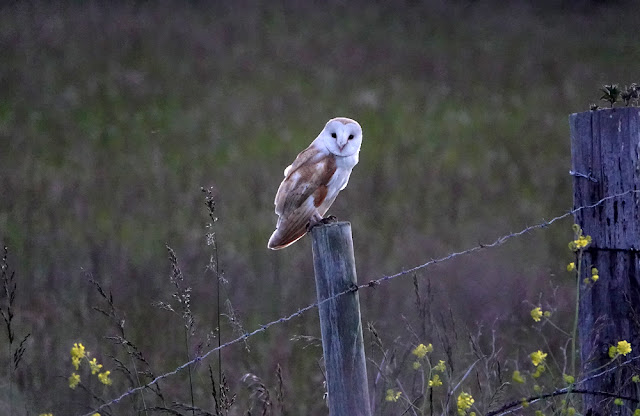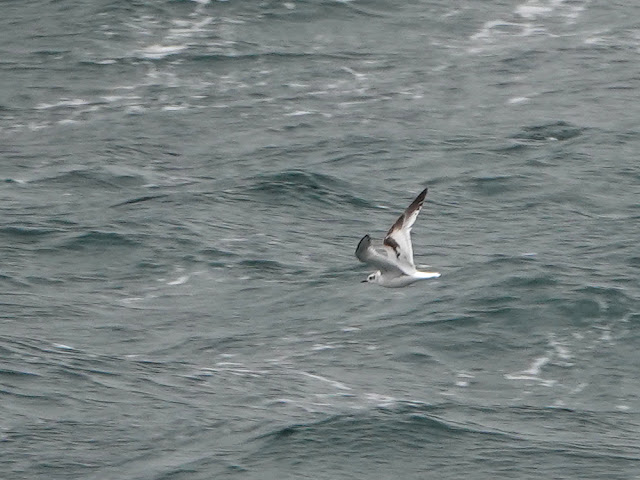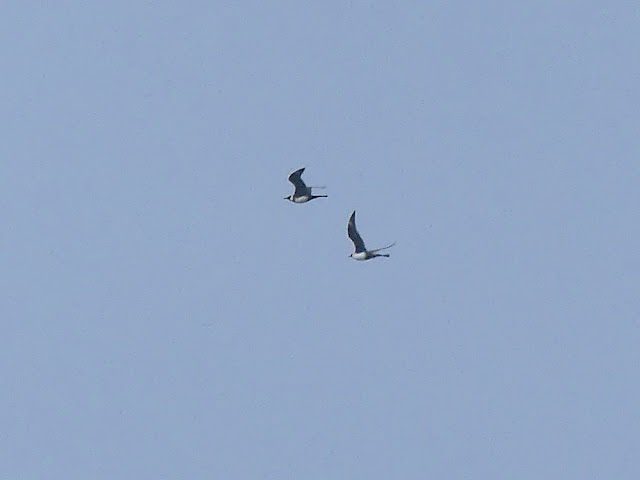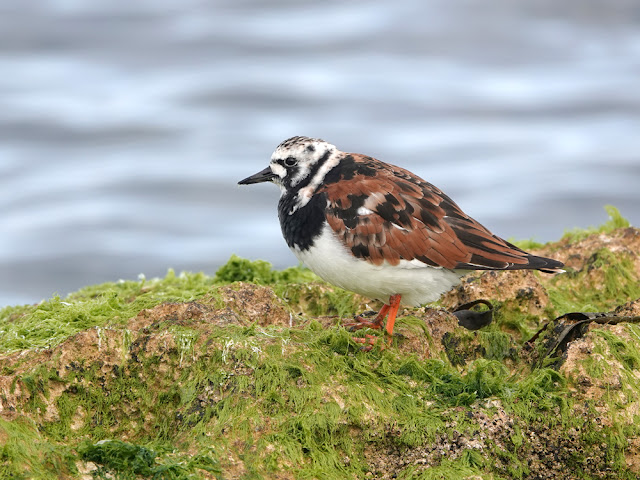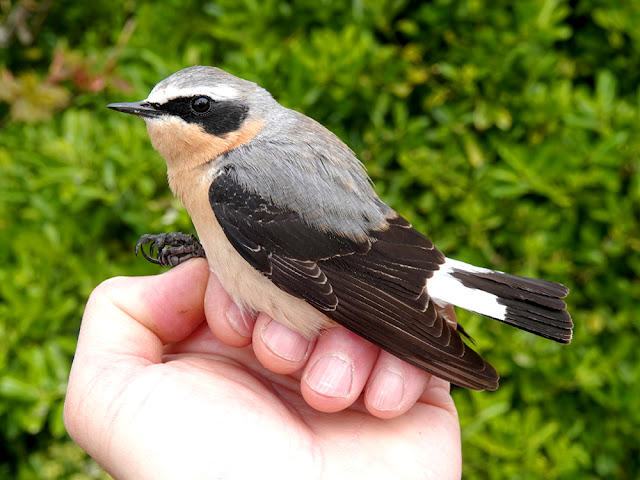31st May
30th May
To break the recent monotony of Striped Hawks a Bedstraw Hawk caught overnight at the Obs pic.twitter.com/9cq2yAfqkz
— Portland Bird Observatory (@PortlandBirdObs) May 30, 2022
Another interesting immigrant moth from last night: Bordered Ermel Ethmia bipunctella from John Lucas' moth-trap at Southwell @DorsetMoths pic.twitter.com/RN5uYdE8Gs
— Portland Bird Observatory (@PortlandBirdObs) May 30, 2022
29th May
28th May
Manx Shearwater 100etc, Common Scoter 113e, Sparrowhawk 1, Dunlin 2w, Little Gull 1e, Black-headed Gull 1e 1n, Swift 5n, Wheatear 7, Whinchat 2, Reed Warbler 4, Spotted Flycatcher 2.
Suckthumb Quarry
Reed Warbler 1.
27th May
26th May
25th May
24th May
— Paul Harris (@PaulUpwey) May 24, 2022
23rd May
22nd May
Not exactly a surprise given the present circumstances but another Striped Hawk last night - this one from our garden moth-trap at the Grove (here with a comparison Privet Hawk) pic.twitter.com/TinZND0W0S
— Portland Bird Observatory (@PortlandBirdObs) May 22, 2022
21st May
Grounded migrants: Wheatear 3, Spotted Flycatcher 3, Turtle Dove 1, Willow Warbler 1.
Sea passage: Manx Shearwater c20etc, Common Scoter 10e, Arctic Skua 3e, Sooty Shearwater 1etc, Black-headed Gull 1e.
Spotted Flycatcher 1.
Turtle Dove 1.
Sanderling 14, Dunlin 12, Whimbrel 1.
20th May
19th May
2 Gems - the first this yr - the best of last night's moth catch at the Obs pic.twitter.com/2YKmJBwhsk
— Portland Bird Observatory (@PortlandBirdObs) May 19, 2022
Another addition to the tally during the current lepidoptera immigration event: a Bordered Straw from our garden trap at the Grove pic.twitter.com/24jrhidWfa
— Portland Bird Observatory (@PortlandBirdObs) May 19, 2022
18th May
As you will see migrants were not attracted to the carefully prepared garden at PBO @PortlandBirdObs too refuel and bathe. 2 CC & 1 WW only stopped over and were ringed. Striped Hawkmoth saved the day and the sea swell was magical!! Hence the atmospheric pic Noise was thunderous pic.twitter.com/Kv0Hm7vgwf
— Peter J Morgan (@PBOprof) May 18, 2022
17th May
16th May
15th May
14th May
13th May
Brisk westerlies don't usually do us many favours so it was quite a surprise when the shout went up this morning for a Bee-eater at the Obs - fortunately it obliged by quickly dropping onto nearby wires for a few minutes but thereafter proved trickier and was seen just briefly twice more before vanishing in the vicinity of Southwell; almost as surprising was the reappearance - for the third day on the trot - of the Sooty Shearwater off the Bill but it too couldn't be found later. Despite the unpromising conditions migrant interest perked up a little, with 20 each of Wheatear and Spotted Flycatcher scattered about the Bill/Southwell, where 3 Redstarts and a Blue-headed Wagtail provided further interest on the ground and a steady throughput of Swallows and House Martins was evident all day; waders included 20 Sanderling at Ferrybridge. The Sooty Shearwater aside, sea interest was limited to 3 Great Northern Divers and an Arctic Skua through off the Bill.
The Blue-headed Wagtail at the Bill © Martin Cade:
Good to see a Bee-eater from the Obs earlier today as well. Spotted by Peter Morgan. pic.twitter.com/kKIZ37Xcww
— Keith Pritchard (@portlandbirder) May 13, 2022
12th May
Martin kindly phoned me in case I wanted to check gulls following tractor in Portland Obs Crown Estate Field - 1st summer Casp. (Flock still around.) pic.twitter.com/Al0BKvJtBk
— Keith Pritchard (@portlandbirder) May 12, 2022
11th May
Today's results would have looked sad indeed without a spirited contribution from the sea - even if those rewards required a good deal of effort to eke out. With rain always threatening but holding off until late in the morning there was ample time available to tap into an impressive passage of 12 Great Northern Divers through off the Bill. Skuas continued to trickle by, with 3 Arctics and a Pomarine through, whilst a Little Gull was a very belated first of the season there; the highlight however was an unseasonable Sooty Shearwater heading west just as the rain set in. A very poor showing from the land included the customary post-rain increase in waders, with 40 Dunlin, 17 Sanderling, 7 Bar-tailed Godwits and 3 Whimbrel at Ferrybridge, but precious little evidence of passerine arrivals: Wheatear, with 7 at the Bill and a scatter elsewhere, was the only migrant managing a total of more than one! A light trickle of Swifts, including 29 inbound at the Bill, provided the only evidence of overhead passage.
There are few more impressive seawatch sights at Portland than a throttle-down, Iceland-bound Great Northern Diver all but skimming the top of the Obelisk as it rounds the Bill...
10th May
— Keith Pritchard (@portlandbirder) May 10, 2022
9th May
8th May
With the breeze back firmly in the east there were hopes for the day and these were quickly realised with the discovery of a Woodchat Shrike at the Bill - initially in the Obs Quarry field it soon made its way up into the Strips where it remained for the rest of the day. More was expected of the sea in the seemingly propitious conditions but it once again proved hard work to garner a respectable tally: 5 Arctic Skuas and singles of Red-throated, Black-throated and Great Northern Divers were the pick from Chesil where a varied selection of small numbers of waders and terns also passed, whilst 2 Shoveler and a Pomarine Skua were additions amongst an otherwise samey selection from the Bill. The shrike aside, the grounded migrant selection included a Cuckoo and a Turtle Dove at the Bill where there was a decent miscellany of late arrivals albeit none bar Willow Warbler (60ish) in any numbers. Visible passage flattered to deceive: the likes of small numbers of overflying Swifts and Spotted Flycatchers offered promise but hirundines in particular weren't at all numerous.
The Woodchat Shrike...
7th May
6th May
The death throes of spring or a temporary blip? - today's rather abject performance from the ground, the sky and the sea was disappointing although, as we near the end of the season for numbers of common migrants, not altogether surprising on another calm, clear day. The grounded passerine situation was particularly dreadful with only Wheatear returning a double-figure total (including 40 at the Bill) and most late spring migrants not represented at all, whilst the sunny sky overhead shouldn't have been so devoid of hirundines as it was; 2 Gadwalls over Ferrybridge and an unseasonable Grey Wagtail over the Bill were the only slightly out of the ordinary sightings. The sea was again comprehensively watched - maybe simply in expectation of what ought to be passing on this date - but passage proved to be painfully slow, with 119 Common Scoter, 2 Black-throated Divers and singles of Great Northern Diver and Pomarine Skua the tally from the Bill.
With any luck a lot of the typically late migrants - the likes of Sanderling, Pomarine Skua and Swift - are just running late; 3 Sanderlings was a very poor total at Ferrybridge © Pete Saunders:
5th May
4th May
A flat calm, bright dawn after a clear night didn't bode well so the variety quickly encountered was a welcome surprise even if numbers fell short of what's been on offer so often just lately. An overflying Serin was the chief prize at the Bill, where amongst the 75 Willow Warblers and 50 Wheatears there were small numbers of nearly everything else that might be expected in early May - a Grasshopper Warbler and one of the very few Goldcrests this spring were perhaps the pick of this back-up selection. Waders featured again in fair numbers, including 65 Dunlin, 35 Bar-tailed Godwits, 3 Sanderling, 2 Whimbrel and a Common Sandpiper at Ferrybridge. Visible passage included a few pulses of Swallows but numbers weren't what might have been expected given the conditions. The fact that not a single skua was logged - that can't have happened very often on this date - spoke volumes for the continuing dire sea situation, with 60 Common Scoter, 4 Red-throated Divers and 2 Great Northern Divers an inconsequential return from the Bill.
The Serin passing over the Obs garden this morning:
We don't fully understand where our migrant Goldcrests hail from but the ringing recoveries suggest at least as far north and east as Scandinavia and Poland; what we're particularly uncertain of is the degree to which birds from nearer to home pass through on passage. What we can say with certainty is that wherever they come from either they're doing extremely badly or they've had a sudden and profound change in their migratory habits: for us to have only trapped and ringed two last autumn and two this spring puts these seasons on a par with 1963 when, in the aftermath of the savage '62-'63 winter that presumably killed off a large percentage of these migrants in their western European wintering areas, none were ringed (our usual annual ringing total runs well into the hundreds). What's the explanation? - frankly, we haven't got a clue: surely recent European winters haven't been harsh enough to decimate these migratory populations to this degree but equally it seems improbable that there's been a sudden shift in the bird's winter quarters such that they no longer impinge on us on passage; maybe European winters have actually got so mild that many are staying closer to their natal areas and far fewer are getting over to this part of the world in the first place? © Martin Cade:











